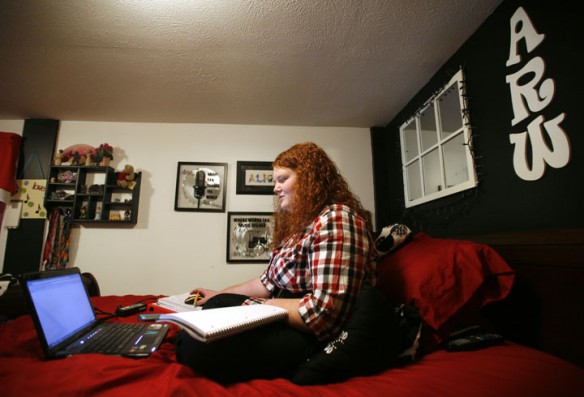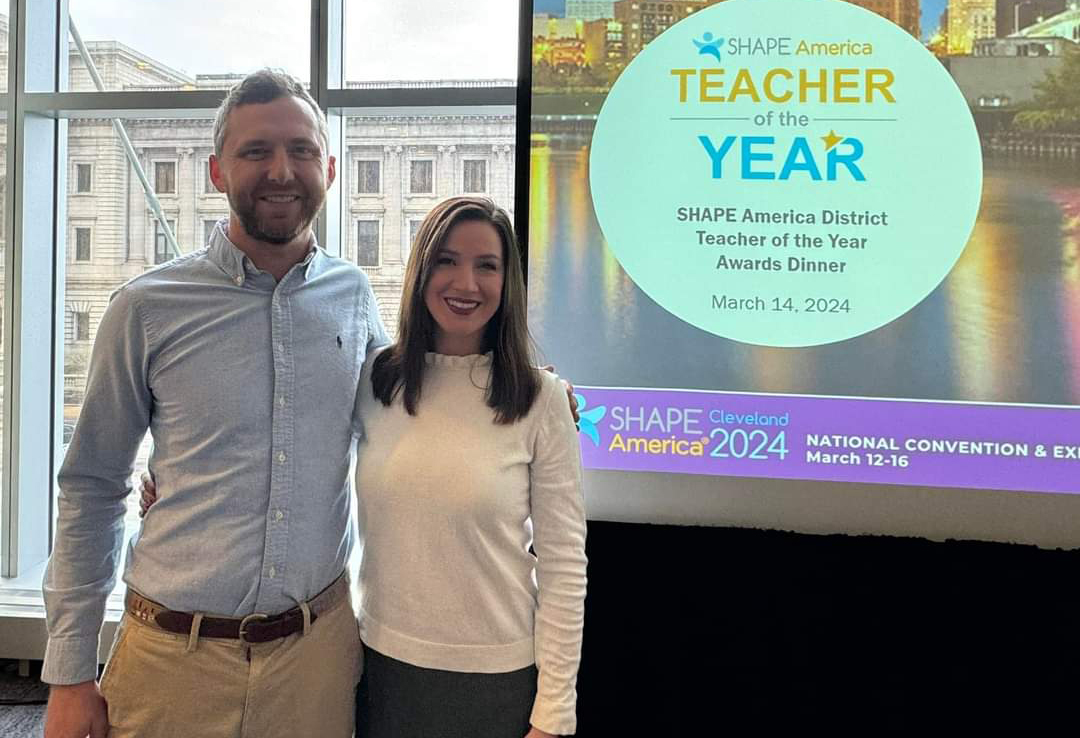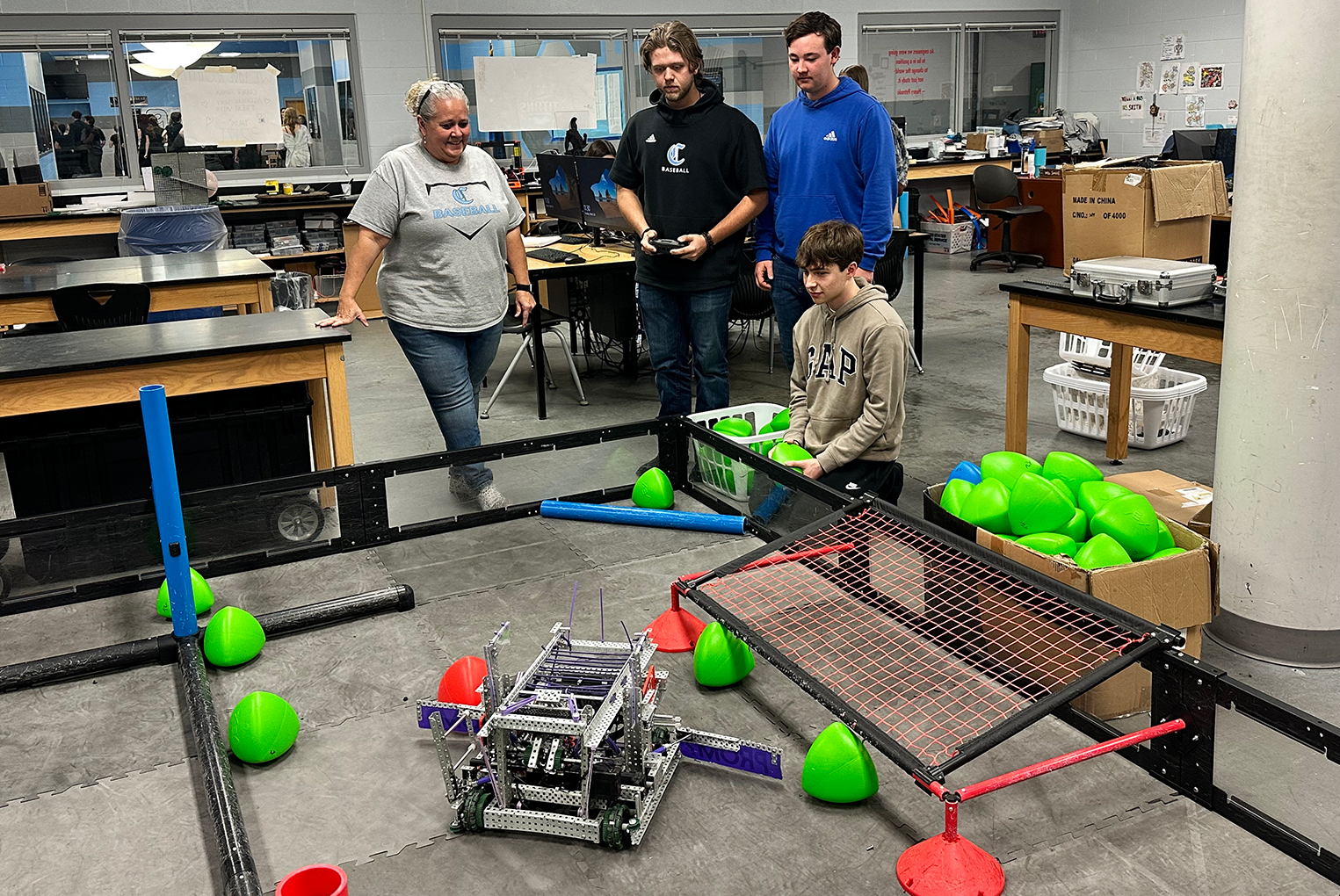
Powell County High School senior Alicia Wasson works on mathematics problems in her bedroom as part of the Snowbound Program in Powell County. Photo by Amy Wallot, Jan. 12, 2012.
In December of 2010, Powell County students were in school for just five days thanks to inclement weather and poor road conditions.
By the end of the harsh winter, the district had called off school 27 times.
Further south, the Owsley County school district had missed 25 days.
Luckily, both districts were participating in a Snowbound Pilot program that allowed them to make up school days in a variety of ways, from sending home “snow packets” containing school work to providing online learning opportunities for students in all grade levels.
Powell County made up five days through the pilot and Owsley six.
“Our district really benefited from this program last year,” said Sarah Wasson, director of pupil personnel for Powell County. “We were able to make up some days, but that wasn’t really the biggest benefit.
“The best part was, we were able to keep students learning,” she added. “After December, we had three days of school in January, but missed the entire next week. It was rough.”
Schools in Powell, Owsley and Letcher counties took part in the Snowbound Pilot during the 2010-11 school year after meeting criteria that included averaging more than 20 days out of school district-wide over a three-year period due to inclement weather.
This year, nine districts are participating in the Snowbound Program: Knox, Lee, Leslie, Letcher, Martin, Owsley, Perry, Powell and Wolfe counties.
Powell County missed 29 days in both the 2008-09 and 2009-10 school years.
When the snow hit Kentucky in December of 2010, the district wasn’t completely prepared for the program to start, but Wasson said teachers and other district personnel made the most of the opportunity.
Teachers created snow packets, mainly for students who didn’t have access to computers or other forms of technology. District websites were updated with learning opportunities for students to access during days away from school. Teachers were instructed to update their Web pages and to make communication easier with students and parents.
Letters were sent home to parents explaining the program and the expectations that came with it. One of those, simply, was that the work wasn’t mandatory.
“There’s no punishment if a child doesn’t do the work,” Wasson said. “We know some kids go to daycare on snow days, and daycares may not be able to support the program.”
Powell County staff members have posted weather work for each school that varies by grade level and school on its district website. All high school students are prompted to work on ACT prep lessons.
A tracking sheet is used to log how much time and what activities students complete during these snow days, also known as nontraditional days for the participating districts.
Based on data from tracking reports or other forms of evaluation, districts apply to the Kentucky Department of Education (KDE) and Commissioner Terry Holliday for a set number of snow days they are allowed to deem as nontraditional and thus not have to make up throughout the school year. The maximum number of days a district can earn as nontraditional is 10 per school year.
In Owsley County, teachers have been active in the process of preparing for this year’s Snowbound Pilot.
Owsley County High School mathematics teacher Jessica Halsey developed a standardized spreadsheet that will be used to collect data for the program, while teachers Stacey Davidson and Tina Bobrowski, along with instructional supervisor Glenn Baker, assist teachers in the lesson development. Andrea Boggs, a special education teacher at Owsley County Elementary School, developed teacher blogs to provide instruction and assistance to students.
Superintendent Tim Bobrowski said his staff has been very receptive of the snowbound program.
“Teachers have participated in professional development to learn to utilize district resources to facilitate student learning on snow days,” Bobrowski said. “Teachers districtwide have developed instructional units utilizing Discovery Education and other resources. At a minimum, the units of instruction contain a pre-test, activities and a post-test. Many teachers utilized Discovery Education’s streaming video, and many branched out to other items via URL links.”
When students don’t have home computers
Snowbound Pilot districts are encouraged to use one of several methods to provide learning opportunities during these snow or nontraditional school days.
“Each district, although the process varies, has a three-part solution,” said David Cook, director of KDE’s Division of Innovation and Partner Engagement.
“Students can do the work from home or another location where they have Internet access,” he said. “The districts are opening their schools for parts of the day, and students can come use the computer labs in the schools if they can safely get there themselves.
“The districts also have created instructional material packets that students can take home and return when they come back to school. In most cases, these districts use these nontraditional instructional days when they know they are going to be out so they can prepare a bit.”
Both Powell and Owsley County school districts have found ways to reach these students using all three approaches.
“We can’t guarantee that each child will do the work, but parents have been helpful in making sure their children use the resources we provide,” Wasson said.
“This year, the school system will be branching out into various areas of the county when road conditions allow for general travel,” Bobrowski said. “On these days, school food service will provide breakfast and lunch at pick-up points within various county communities.
“At many of these community locations, Internet access also will be available for students so that they can access lessons,” he added. “On days when road conditions allow safe travel for individuals, teachers will be at schools. (Individual travel is sometimes possible when school bus travel is still not safe.)”
Both districts reported approximately a 90 percent success rate in the number of students who worked on snowbound material.
“We just want kids to continue to learn. One snow day is no big deal, but we have so many that it really adds up,” Wasson said. “If students stop playing video games and pick up an Accelerated Reader book or get on Education City, it pays off. With the year we had last year, our test scores still improved, and I think this program contributed to that.”
MORE INFO …
David Cook, david.cook@education.ky.gov, (502) 564-4201 ext. 4832
Sarah Wasson, sarah.wasson@powell.kyschools.us, (606) 663-3300
Tim Bobrowski, tim.bobrowski@owsley.ky.gov, (606) 593-6363








Leave A Comment